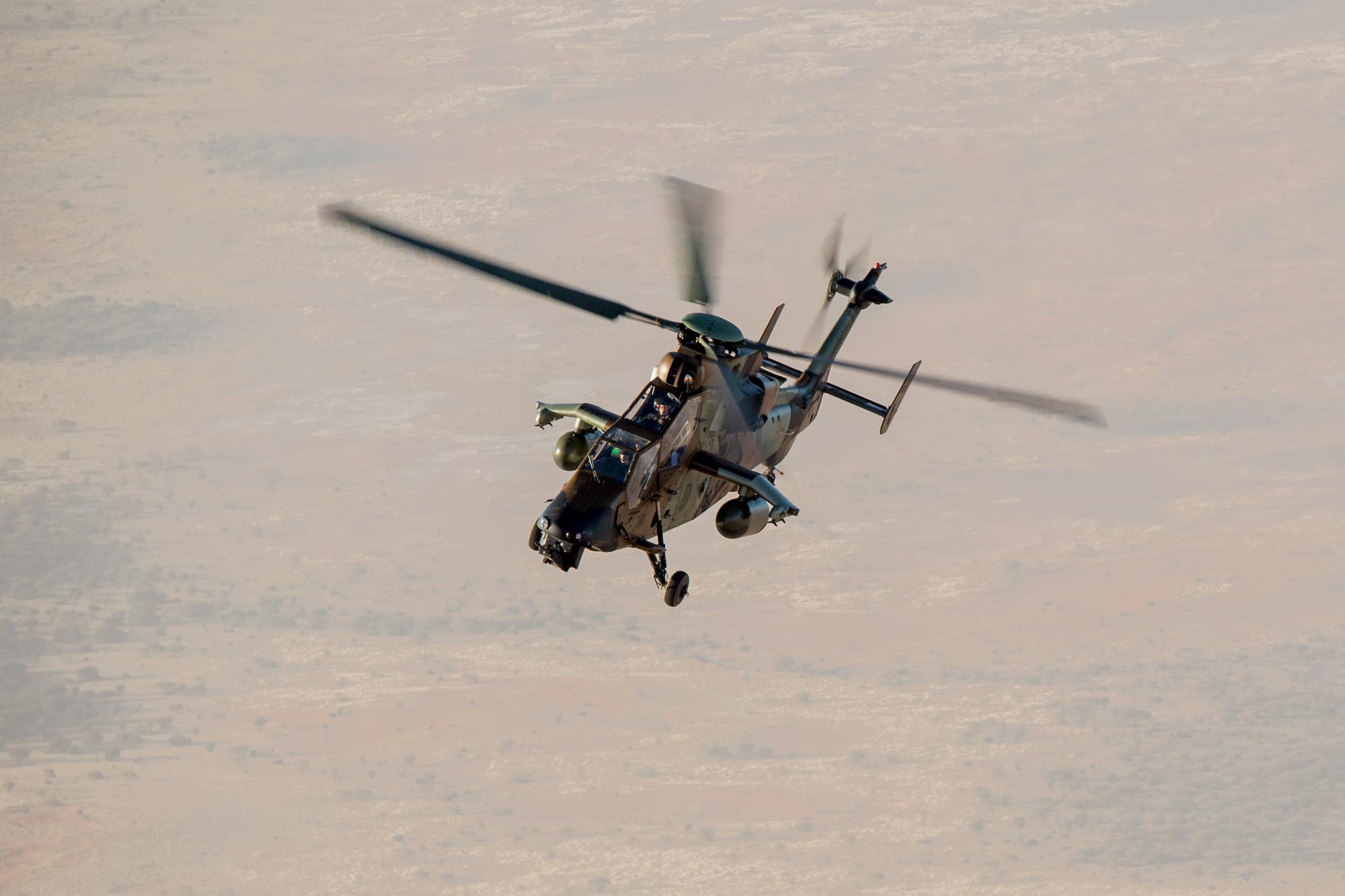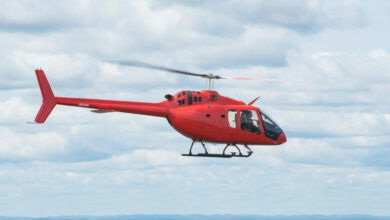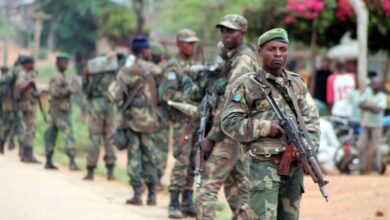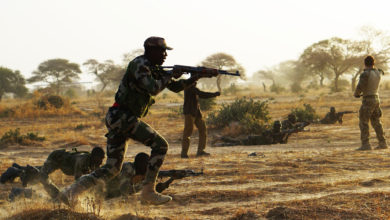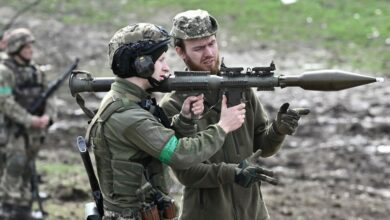Thirteen soldiers from France’s anti-terrorist Barkhane force in Mali were killed after two helicopters collided during an operation in the country’s north, the French presidency said Tuesday, November 26.
The accident occurred on Monday evening while the forces were engaging jihadist fighters who have staged a series of deadly strikes in northern Mali in recent weeks, President Emmanuel Macron’s office said.
“The president hails with the greatest respect the memory of these soldiers … who lost their lives in an operation and died for France in the hard fight against terrorism in the Sahel,” it added in a statement.
The incident occurred while the helicopters were reinforcing ground troops pursuing insurgents in the Liptako region, near the borders of Burkina Faso and Niger, the armed forces ministry said.
The defense ministry said a Tigre attack helicopter collided with a larger Cougar military transport helicopter around 7:40 p.m. local time (1940 GMT).
The collision occurred shortly after troops engaged the insurgents who were fleeing on motorbikes and in a pick-up truck.
Armed Forces Minister Florence Parly said Monday’s operation was particularly risky because it took place in “total darkness” on a moonless night, but the exact cause of the collision remains unknown.
Six officers and a master corporal were among the victims. The 13 killed were the two crew members of the Tigre of the 5th Combat Helicopter Regiment, the five crew members of the Cougar, four operators of the Mountain Commando Group of the 4th Fighter Regiment, a GCM operator of the 93rd Mountain Artillery Regiment) and a GCM operator of the 2nd Foreign Engineer Regiment, the ministry said.
An inquiry has been opened into the cause of the mid-air collision, Parly said in a separate statement.
At a later press conference, the Chief of Staff of the Armies, General Francois Lecointre, said the incident occurred around 20 km from Indelimane.
Lecointre did not identify the insurgents targeted, but said Islamic State in the Greater Sahara was the main insurgent force in the area. Since May, ISIS has attributed insurgent activities in the Mali-Burkina Faso-Niger tri-border area to its West Africa Province affiliate, rather than to what was previously known as ISGS.
On November 16, a French commando was seriously injured in a counter-ISIS operation that killed 5 ‘terrorists’ around 20 km south of Indelimane, also rendered as In Delimane.
ISIS claimed two significant attacks in the Indelimane area earlier this month. It said its fighters were responsible for an attack on a military base in Indelimane that killed at least 49 people, and for a roadside bomb blast that killed a French soldier between Gao and Menaka the following day. ISIS said that attack was also in the Indelimane area.
‘Died for France’
The incident is the deadliest since France intervened in Mali in 2013 and brings to 38 the number of French soldiers killed in Mali since the intervention began.
It is also the heaviest loss for the French army since the 1983 attack on the Drakkar building in Beirut, in which 58 paratroopers were killed.
The French president “bows in front of the pain of their families and their loved ones and expresses his deepest condolences, and assures them of the unshakeable solidarity of the French nation,” his office said.
Macron also hailed the “courage of all the French soldiers engaged in the Sahel and their determination to continue their mission.”
Mali has sustained a wave of insurgency strikes on army outposts and other targets, with more than 50 killed over just a few days in early November.
Mali’s President Ibrahim Boubacar Keita warned after the strikes that the country’s stability was at stake, urging people to rally around the country’s besieged armed forces.
It is one of the countries in the Sahel region of Africa that has been caught in the eye of the jihadist storm since 2012, along with Niger, Burkina Faso, Niger and Chad.
Unrest in the Sahel
In 2012 a Tuareg separatist uprising against the state was exploited by Islamist extremists linked to al-Qaeda who took key cities in Mali’s desert north.
France began its Operation Serval military intervention in its former colony early the next year, driving the jihadists from the towns, and the MINUSMA peacekeeping force was then established.
But the militant groups have morphed into more nimble formations operating in rural areas, and the insurgency has gradually spread to central and southern regions of Mali and across the borders into neighboring Burkina Faso and Niger. Large swathes of Mali remain outside government control, and inter-ethnic bloodshed is a regular occurrence.
Many armed groups are active in Mali and the wider Sahel region, but the majority of attacks are attributed to JNIM, which formed in March 2017 from a merger of several smaller groups including the Sahara branch of al-Qaeda in the Islamic Maghreb, Ansar Dine and al-Mourabitoun. JNIM’s leadership has pledged allegiance to al-Qaeda leader Ayman al-Zawahiri.
The U.N. says that since January more than 1,500 civilians have been killed in Burkina Faso and Mali, and more than one million people have been internally displaced across the five Sahel states – more than twice the number displaced in 2018. Access has become increasingly difficult, but 12 million people are in need of humanitarian assistance.
The Serval mission evolved in August 2014 into Operation Barkhane, and roughly 4,500 French troops are deployed in the region, including around 2,700 soldiers in Mali. Barkhane has a growing international dimension, with European partners sending more troops and equipment. Denmark is to send two helicopters and up to 70 troops to support Barkhane in December and Estonia is to almost double the size of its Barkhane contingent in 2020. Chinook helicopters from the United Kingdom currently support the operation.
Operation Barkhane focuses activity in insurgent-hit Mali, Niger and Burkina Faso, and troops work alongside other international operations, including the 14,000-strong MINUSMA U.N. stabilization mission in Mali and the G5 Sahel Joint Force (FCG5S), a planned 4,500-strong joint counter-terrorism force comprising troops from Burkina Faso, Chad, Mali, Niger and Mauritania.
France has also been trying to build international support for a new military force to work alongside Barkhane.
French plans for a new international special operations task force for the Sahel were first reported in early October, and on November 5, Armed Forces Minister Florence Parly said that France expected the new force – dubbed “Takuba” – to deploy in Mali by 2020. Around a dozen European states “have expressed an interest in taking part in this initiative,” a French Armed Forces spokesperson said.
Estonia is the first partner to confirm a special operations forces deployment to Takuba. A defense ministry spokesperson told The Defense Post that special forces will deploy to Mali in the second half of 2020 and that force will ‘assist, advise and accompany’ the Malian Armed Forces.
Last week, senior officials said the United States is seeking a meeting of the Coalition against ISIS early in 2020 to focus on threats in West Africa and the Sahel.
With reporting from AFP. This post was updated on November 26.

